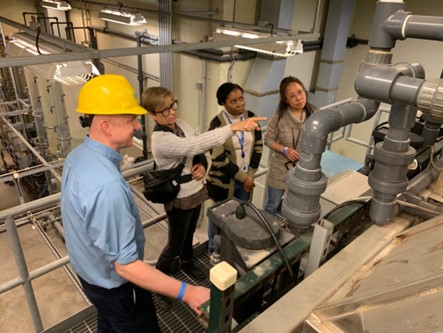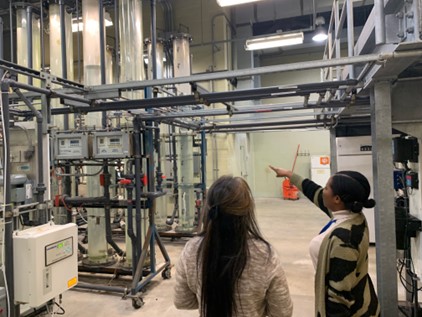DETROIT – – Wayne State University has received a $584,114 contract to develop a collaborative research project with the Great Lakes Water Authority (GLWA) to create a workforce and laboratory center of the future.
The three-year long project will focus on developing the existing Waterworks Park Pilot Plant facility to perform applied research, testing and evaluation, and workforce development for new and emerging technologies.

“A significant component of this research effort is the development of methods for scaling results from pilot-scale research through to full scale implementation,” said Dr. John Norton, director of Energy, Research, and Innovation for the Great Lakes Water Authority. “There are huge challenges in applying basic research to real world situations. Wayne State University is the ideal partner for us to understand how to scale laboratory-sized science to a facility our size.”
The project will be based out of the pilot facility located in the Waterworks Park water treatment plant complex on Jefferson Avenue. Although the water treatment plant is located at the historical site of the iconic Detroit-based treatment plant, it was completely rebuilt in the late 1990s and represents one of the most advanced modern water treatment plants in existence. As part of the reconstruction, engineers designed and included a complete and functional small-scale model of the full-scale treatment system.
“The pilot plant is essentially a 12,000 to 1 scale model of the full treatment system,” said Norton. “Anything we need to do at the full-scale facility we can first operate within the pilot plant to evaluate how the system responds. As you can imagine, this is very useful for training our operators and chemists because they can experiment and learn how the system responds under different scenarios before trying to do it with the full-scale plant.”

Carol J. Miller, Ph.D., P.E., professor of Civil and Environmental Engineering and director of Healthy Urban Waters at Wayne State will lead the project, along with co-lead Yongli Wager, Ph.D., associate professor of Civil and Environmental Engineering at Wayne State. They and the full support team will provide important knowledge that will help GLWA proactively respond to different water treatment scenarios and emerging water quality concerns. The educational and workforce development programs that also comprise this project will help to address the critical shortage of technicians and engineers for water utilities nationwide.
“Our work with GLWA will initiate with a strategic plan to optimize benefits to the GLWA user community, treatment plant operators, the utility industry and the water ecosystem,” said Miller. “In addition, we are working to maximize economic benefits to the community, as well as include workforce training and job opportunities. On the research side, there are several focus areas including verification of scale-up processes, in-plant learning tools and process optimization considering treatment variables including coagulant and disinfectant materials. This training is critical for evaluating water treatment processes and developing scenario-based proactive responses to different water treatment and emerging water quality concerns.”
About Great Lakes Water Authority
The Great Lakes Water Authority (GLWA) is the provider-of-choice for drinking water services to nearly 40 percent, and efficient and effective wastewater services to nearly 30 percent, of Michigan’s population. With the Great Lakes as source water, GLWA is uniquely positioned to provide those it serves with water of unquestionable quality. GLWA also has the capacity to extend its services beyond its 88-member partner communities. As part of its commitment to water affordability, the Authority offers a Water Residential Assistance Program to assist low-income households in participating member communities throughout the system. GLWA’s board includes one representative each from Oakland, Macomb and Wayne counties, two representatives from the city of Detroit, and one appointed by the Michigan governor to represent member partner communities outside of the tri-county area.
About Wayne State University
Wayne State University is one of the nation’s pre-eminent public research universities in an urban setting. Through its multidisciplinary approach to research and education, and its ongoing collaboration with government, industry and other institutions, the university seeks to enhance economic growth and improve the quality of life in the city of Detroit, state of Michigan and throughout the world. For more information about research at Wayne State University, visit research.wayne.edu.
